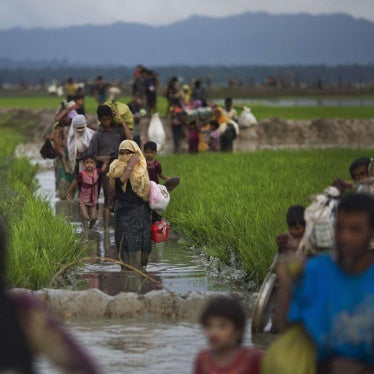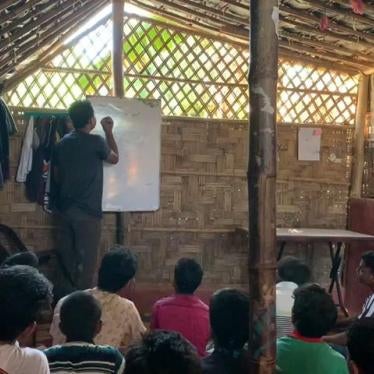SITTWE, Burma — Burma is spiralling into violence once again, and as the former military dictatorship engages in another wave of mass atrocities, the European Union has become suddenly shy at the diplomatic wheel. Unless it takes action, the bloc’s hands-off approach risks rolling back hard-won progress and fostering extremist violence.
Rakhine State, on the western coast along the Bangladesh border, is the crisis’ ground zero. Far from the economic boom of Rangoon, Burma’s commercial capital, local and national authorities have long maintained a system of oppression that strips hundreds of thousands of ethnic Rohingya Muslims of their most basic rights.
In October last year, militants from a movement called Harakah al-Yaqin attacked border posts in northern Rakhine State, killing nine members of Burma’s security forces. The military’s response was bloody and ruthless; it targeted the inhabitants of whole villages and used scorched-earth tactics the Burmese army has deployed for decades against other ethnic groups such as the Karen, Shan and Kachin.
Army and police forces participating in the so-called “clearance operation” laid waste to entire villages, burning hundreds of houses, killing residents, and raping women and girls in front of their family members. The abuses inflicted on the Rohingya “seem to have been widespread as well as systematic, indicating the very likely commission of crimes against humanity,” the United Nations’ Office of the High Commissioner for Human Rights said in February. The U.N.’s special rapporteur on Burma has also backed the accusation.
And yet the EU, which played a key role in nurturing the country’s democratic transition and leads the discussions on Burma at the U.N. Human Rights Council in Geneva, has not taken a stand against Burmese army’s rampant atrocities in Rakhine State.
Decades of abuse
Some 120,000 Rohingyas languish in prison-like conditions in a string of displaced people camps stretching west from the state capital of Sittwe. Most have been confined there for almost five years following mob violence in June 2012, when ethnic Rakhine Buddhists, assisted by government forces, drove the Rohingya out of the city in a campaign of ethnic cleansing. Satellite images show entire Rohingya neighborhoods destroyed alongside Sittwe’s historic mosques, which now lay empty in the heart of the city.
When I spoke to the Rohingya men on the camp management committee on a recent visit, they sounded defeated. “It’s like being in a bird cage,” said one. A once successful businessman described now living in abject poverty because he cannot leave the camp to work. Many Rohingya properties have been either bulldozed, burned, taken over by the state government or now lay vacant in town.
The Burmese army and police, who guard and ostensibly provide law and order in the camp, routinely arrest, humiliate, beat and extort its inhabitants — especially if they venture out to fish or to collect wood. One Rohingya man told me about having to pay “10 beers and a chicken” to police officers for his freedom after being detained for an imaginary infraction.
A new generation of kids is being raised in the camps, segregated from the Buddhist children they used to play with. Rohingya teenagers have virtually no access to secondary education, let alone university. A shy 14-year-old told me he had no choice but to go abroad to pursue his dream of becoming a doctor. Going abroad usually means risky travel through military checkpoints and on rickety boats to Bangladesh or further, on to Malaysia.
For emergency medical trips to the Sittwe hospital, camp residents need to obtain authorizations and pay heavy bribes. Even when they get a green light, they cannot go accompanied by loved ones; hospital staff who don’t speak their language treat them in a secluded part of the hospital. Far too many never make it to the hospital and die for lack of care.
“These camps are holding areas before they leave [the country],” said a seasoned humanitarian official. “The government doesn’t want them going back [to their homes.]” He described a “systematic campaign of terrorization” in which Rohingya have been “treated like dogs.”
Since the most recent violence started in October, at least 74,000 Rohingya have fled to Bangladesh to escape this collective punishment, and U.N. sources now believe their return may be virtually impossible. Their names have been permanently struck from the official households’ surveys, and hundreds of Rohingya houses, shops, and even a mosque in northern Rakhine State have been marked for destruction by authorities under the pretense they lacked proper building permits.
In Bangladesh, they join another 200,000 or more Rohingya who previously fled previous waves of persecution, discrimination and violence.
U Tin Maung Swe, the state secretary in Rakhine State, took pains to explain to me that the Rohingya were kept in camps for their “own security.” They “cannot go back to their original places” because Rakhine extremists would attack them, he claimed.
Factories and markets should be set up so people can start “new lives” in the camps, he suggested. But the Rohingya say their livelihoods are in Sittwe and have boycotted government-constructed market stalls, which lay unused in the middle of the camp — testament to the fact they are not yet resigned to their segregated fate.
The state secretary handed me a copy of a book he said would help understand the situation in Rakhine State. It made a clumsy attempt to explain why Rohingya should have no rights in Burma and was filled with hateful clichés; “behind the mask of the ‘poor Rohingya refugees’ there is a ‘crooked smile’ of Islamists,” it warned.
In this climate of discrimination and abuse, it is unsurprising that some Rohingya would turn to militancy.
Diplomatic paralysis
During Burma’s long military rule, such large-scale crimes would have evoked outrage in many foreign capitals. But in bustling and hopeful Rangoon, few diplomats and U.N. officials show any sense of alarm. Enamored by Burma’s democratic transition and the economic opportunities it presents, they appear paralyzed at the idea of criticizing the de facto head of state, Aung San Suu Kyi.
The erstwhile democracy icon and Nobel Peace Prize laureate has no way to exercise control over the army, according to the 2008 constitution penned by the military, but she has been unwilling to take a public stand in support of the Rohingya in the face of widespread bigotry from the general population.
So what should be done? For starters, the EU must work with the United States, the Organization of Islamic Cooperation and others to adopt a resolution at this month’s session of the Human Rights Council creating an independent, international investigation into serious human rights abuses in Rakhine State and demanding that Burmese authorities cooperate with the probe.
The U.N. Security Council, led by its EU members, should urgently request a briefing on the situation to make clear to the Burmese authorities, particularly the military, that the Council will not ignore crimes against humanity or major refugee flows.
Burma’s donors, who are pouring huge sums of development aid into the country, should signal that unchecked abuses of the Rohingya could result in a return to the kind of targeted sanctions that were recently lifted to reward the country’s reform process — a process that is now in peril.
The U.N. system must also finally get into gear. Although many U.N. officials are in full crisis mode, much of the body’s response feels subdued. Humanitarians have warned that familiar mistakes are being repeated, and during my visit a U.N. official wondered aloud if the U.N. is “becoming complicit” to the oppression of a population by subsiding quasi-prison camps. But no one has taken concrete action.
Abuses of a historical nature are being committed. The EU, the U.N. and the rest of the international community must confront the abusers and stand with the victims.








